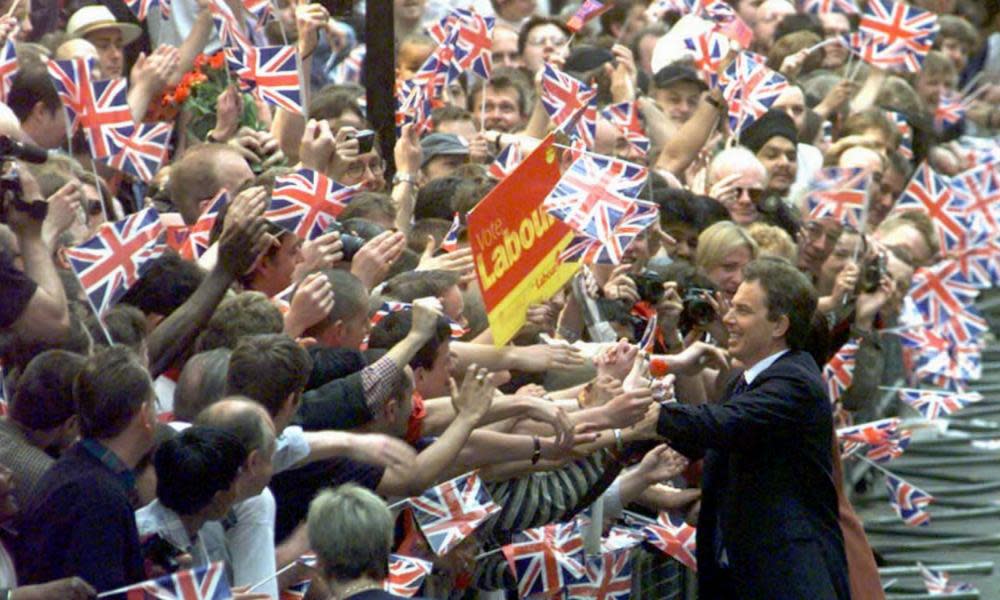Can Labour win back its heartlands? Not by turning blue | Jeremy Gilbert

It’s only now we are beginning to realise how much the world changed in 2016. The UK voted for Brexit, the US elected Trump, Marine Le Pen emerged as a serious contender for the Elysée. Less obvious at the time was that a swath of former Labour voters in the north and Midlands, who had voted for Ukip in recent elections, began an unexpected journey into the Tory fold.
A few weeks ago marked the 20th anniversary of Tony Blair’s 1997 landslide. It is hard to avoid the sense that an era has ended: an era defined as much by Blair as by any other figure. It began with the election of Bill Clinton in 1992. Clinton, then Blair, proposed a “third way” politics, neither right nor left. It maintained the core Thatcherite commitment to privatisation, low taxes, high profits, weak unions, competition, individualism and a deregulated financial sector. But it jettisoned the Victorian social morality and lightly coded racism of Thatcher, Reagan and the rest of the “new right”.
The third way embraced feminism, anti-racism and gay rights, provided they didn’t challenge the economic status quo. Instead of socialism and democracy, it offered everyone the chance to compete in the labour market. Above all, the third way celebrated globalisation as the great engine of economic growth and progress towards a truly cosmopolitan culture.
Cosmopolitan culture is not a bad idea. It implies a liberal, tolerant, non-exclusive attitude. Historically, this is a mindset typical of merchants, financiers, artists and intellectuals. But cosmopolitanism has also been embraced by radical workers, infused with the internationalist spirit of communism, and by the urban poor in places where multiculturalism has been a fact of daily life for generations.
I think cosmopolitanism was a key reason why the New Labour coalition held together for as long as it did. There were always Labour voters in cities, in the more militant unions, in university towns and in the public sector, who would have preferred a more radical programme. But we knew from the bitter experience of the 1980s that there were not enough of us to win an election, at least in a country whose media was so skewed to the right. And after 18 years of Tory rule, we were relieved to have a government that at least encouraged an open, tolerant, sexually liberal and multi-ethnic culture to thrive.
At the same time, as much as we resented the Iraq war and the private finance initiative, many of us were being offered a lifestyle that even our parents couldn’t have dreamed of. So we were acquiescent, even if never quite reconciled, to the New Labour agenda.
The leave-voting heartlands would certainly not vote for Blair’s brand of Europhile neoliberalism
But there were others, in the north and the Midlands, in small towns and post-industrial regions, who had a very different experience. They too belonged to social groups who had traditionally voted Labour. But the third way did not offer them the consolations that it offered those of us in the cities and professional classes. Instead it offered them an experience of permanent decline. Accepting globalisation as a fact of life, New Labour made no effort to bring back industrial jobs. When migrants came from eastern Europe, looking for work, many citizens of the post-industrial towns experienced this as a threat to their already precarious livelihoods, rather than as an opportunity for cultural enrichment.
The alienation of provincial and post-industrial working-class voters, which has now reached a crisis point, particularly in the Midlands, did not begin with Corbyn, but with Blair, who was elected in 1997 on a historically low turnout. Between 1997 and 2010, Labour lost millions more working-class voters. But how have so many of them ended up going Tory?
With memories of Thatcherism still strong, many “traditional” working-class voters were never going to vote Tory in the 1990s or early 2000s. During that time, many voted for nobody or flirted with the BNP. They were never going to vote for David Cameron, who espoused just the same mixture of neoliberal and cosmopolitan values as New Labour – the values now being championed by George Osborne as a newspaper editor. Many of these voters went to Ukip after 2010. But after voting for Brexit last year, many of them now appear ready to vote for a Conservative party which seems to have rejected cosmopolitan culture altogether.
Does this mean that Labour has no choice but to reject its cosmopolitan legacy? This is the claim made by advocates of the “blue Labour” agenda, who think that only by rejecting internationalism, multiculturalism and social liberalism can Labour ever win back support. The trouble with this view is that the small towns and former mining regions are not Labour’s only heartlands. Labour is just as dependent on its supporters in the multicultural cities. And if it went back to Blairism, as others advocate, it is not clear who would be willing to support Labour now. The leave-voting heartlands would certainly not vote for Blair’s brand of Europhile neoliberalism.
Is there another way? There could be. I don’t think the voters of the north and Midlands are congenitally xenophobic. But they want a vision of the future in which there is something for them: good jobs above all. Their rejection of cosmopolitan culture is primarily motivated by the fact that they have come to associate it with decades of de-industrialisation.
A clear vision of an alternative future – and a break with 40 years of stagnation and decline – could yet win them over. Whether Labour can offer that remains to be seen, but the party’s improved poll showing, on the back of its first decisively social democratic manifesto for 30 years, suggests it is beginning to do just that.

 Yahoo News
Yahoo News 
